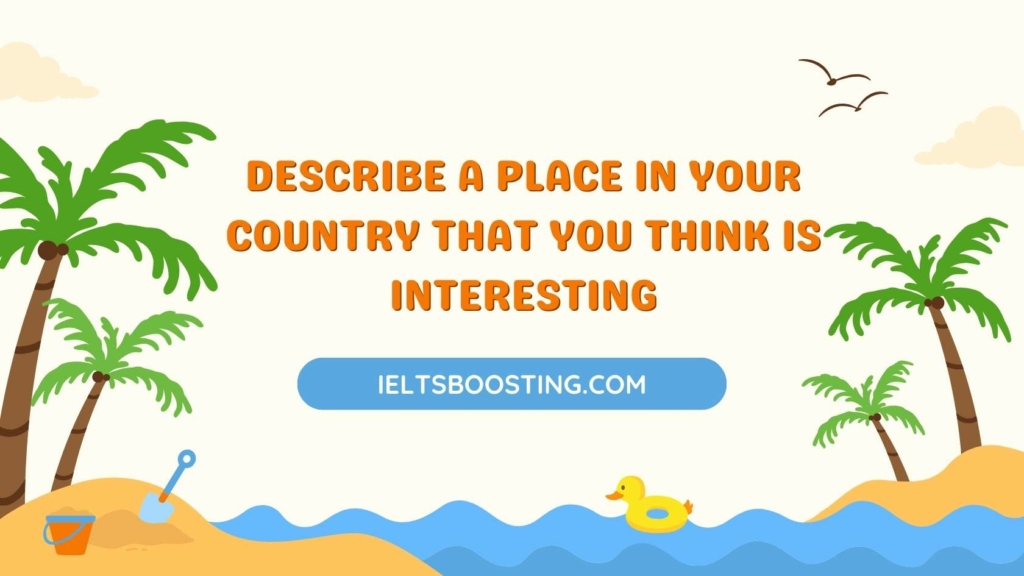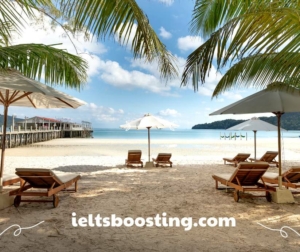Describe a place in your country that you think is interesting
You should say to describe a place in your country that you think is interesting
Where it is
How you knew it
What special features it has
And explain why you think it is interesting
Sample answer to describe a place in your country that you think is interesting
One of the most fascinating places in Vietnam is the ancient town of Hoi An, located in the Quang Nam Province, along the central coast of the country. I became acquainted with this captivating town through my friends and later decided to visit it myself. Hoi An is a UNESCO World Heritage Site and is known for its well-preserved historic architecture, unique cultural
fusion, and vibrant atmosphere.
What sets Hoi An apart are its special features. The town is a living museum of traditional Vietnamese and Chinese architecture, with charming wooden houses, narrow winding streets, and picturesque canals. What’s truly remarkable is the town’s lantern-lit nightscape. When the sun sets, the streets come alive with colorful lanterns of all shapes and sizes, creating a magical and romantic ambiance. Hoi An is also renowned for its diverse culinary scene. It offers some of the best Vietnamese cuisine, including Cao Lau and White Rose dumplings. The local markets and food stalls provide an authentic taste of Vietnamese street food, making it a paradise for food enthusiasts like myself.
What makes Hoi An particularly interesting is its rich history as a major trading port during the 16th and 17th centuries. The town has preserved its heritage remarkably well, and you can visit old merchant houses, assembly halls, and ancient temples that tell the story of its past. Furthermore, Hoi An’s beautiful beaches are just a short bike ride away, providing a perfect
blend of culture and relaxation.
Vocabulary and Phrasal Verbs with Definitions in Vietnamese:
● Fascinating (adj) – Lôi cuốn, hấp dẫn.
● Ancient town – Phố cổ.
● UNESCO World Heritage Site – Di sản thế giới UNESCO.
● Well-preserved (adj) – Được bảo tồn tốt.
● Cultural fusion – Sự kết hợp văn hóa.
● Vibrant (adj) – Sôi động, huyên náo.
● Living museum – Bảo tàng sống động.
● Picturesque (adj) – Đẹp như tranh.
● Lantern-lit (adj) – Sáng bởi đèn lồng.
● Nightscape (n) – Khung cảnh ban đêm.
● Culinary scene – Trường cảnh ẩm thực.
● Authentic taste – Hương vị chân thực.
● Heritage (n) – Di sản.
● Merchant houses – Nhà thương gia.
● Assembly halls – Hội trường.
● Blend (n) – Sự kết hợp.
● Relaxation (n) – Sự thư giãn.
Explore more: forecast speaking quy 3 2023

Describe a place in your country that you think is interesting
Part 3-Describe a place in your country that you think is interesting
How can people access travel information?
Accessing travel information has become increasingly convenient thanks to the digital age. With the internet, people can easily find details about destinations, accommodations, local customs, and transportation options, all from their computers or smartphones. For instance, a traveler planning a trip to Paris can use various online platforms to book flights, find a well-reviewed hotel in the city center, learn about the local cuisine, and even map out their sightseeing itinerary using dedicated travel apps or websites.
Do people have different personalities in different regions of your country?
Yes, people often exhibit different personalities in various regions of a country due to cultural, historical, and environmental influences. These regional differences shape attitudes, behaviors, and social norms, creating distinct local identities and characteristics. For instance, individuals from the northern part of Vietnam, particularly Hanoi, are often perceived as conservative and traditional in their values, while those from the southern region, like Ho Chi Minh City, are seen as more open, dynamic, and business-oriented, reflecting the diverse and vibrant nature of the city.
What causes the differences between different regions of your country?
The differences between various regions in a country are primarily caused by historical, cultural, and geographical factors. The differences between regions in Vietnam are significantly influenced by environmental factors and climate, leading to distinct economic behaviors and lifestyles.For example, the central regions of Vietnam, frequently affected by storms and harsh weather, have developed a culture of saving and cautious spending, as residents need to be prepared for natural disasters. In contrast, the southern regions, blessed with a favorable climate and abundant resources like rivers and fish, tend to have a culture of freer spending, reflecting their more stable and prosperous environmental conditions.
Is it just youngsters who like to try new things, or do people of your parents’ age also like to try new things?
It’s not just youngsters who enjoy trying new things; people of older generations, including those of my parents’ age, also show a keen interest in new experiences. This openness to novelty is not limited by age but is more about individual personality and life circumstances. For example, many people in their 50s and 60s, including my parents, are increasingly exploring new technologies, travel destinations, and hobbies, reflecting a broader societal shift towards lifelong learning and exploration.
Is a great tourist destination also a good place to live?
While a great tourist destination may offer many attractions, it doesn’t necessarily translate into a good place to live for everyone. The appeal of tourist spots often lies in their unique attractions, leisure facilities, and scenic beauty, which may not meet the practical needs of residents. For example, a city known for its vibrant nightlife and tourist attractions, like Las Vegas, may not provide the tranquility and community atmosphere that some residents seek for their daily lives, despite its appeal to visitors from around the world.
Why do people who go to live in small towns think these towns are more interesting than the big cities?
People who move to small towns often find them more interesting than big cities due to the unique sense of community and tranquility they offer. Small towns provide a slower pace of life, closer connections with neighbors, and often a stronger sense of local culture and history, which can be very appealing. For example, For example, someone moving from a bustling city like Ho Chi Minh to a small town in Vung Tau might appreciate the close-knit community, the scenic natural surroundings, and the absence of urban stressors like traffic and noise.



